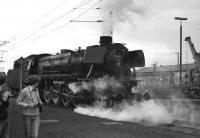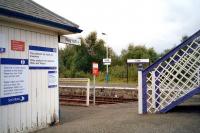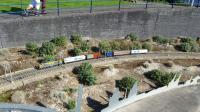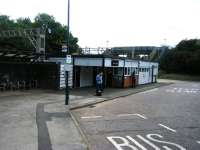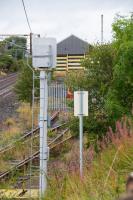This day in history 07 September
Images

Rothesay Pier: Ex-LNER DEPV Talisman approaching Rothesay from the north west in September 1955.
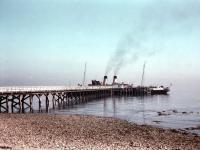
Whiting Bay Pier: A misty morning at Whiting Bay, Isle of Arran, on 7 September 1955, with TS Duchess of Montrose paying a visit. When the wooden pier was opened in 1899 it was the longest in the Firth of Clyde. It remained in use until 1962 and was finally demolished during 1964. [Ref query 12 June 2018]
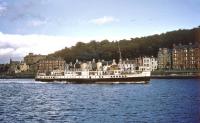
Rothesay Pier: The paddle steamer 'Jupiter' photographed off Rothesay in September 1955. Built in 1937 at Fairfield's in Govan, the vessel made her final voyage in 1961.
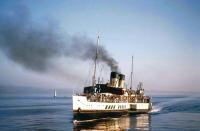
Dunoon Pier: The ex-LNER paddle steamer 'Waverley' off Dunoon in September 1955, with the light beacon on the Gantocks rocks in the background. (A location with which she would become all too familiar in 1977.)
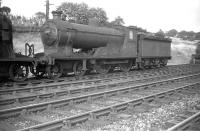
Hawick [2nd]: 62483 Glen Garry in the sidings to the north of Hawick station, probably photographed in September 1958 following its withdrawal from 64G the previous April.

Kildonan: Black 5 no 44785 heads south from Kildonan on 7 September 1960 with the afternoon train from Wick to Inverness. The photographer had joined the train at Georgmas Junction, having arrived there off an earlier connection from Thurso see image [[28876]].
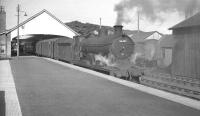
Thurso: Pickersgill 3P 4-4-0 no 54491 awaits its departure time with a train at Thurso in September 1960. The locomotive was eventually withdrawn from Wick shed (60D) at the end of 1961.
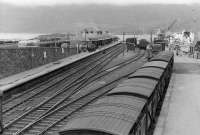
Kyle of Lochalsh: General view over the station at Kyle of Lochalsh on 7 September 1961 with Loch Seaforth, recently arrived from Mallaig, berthed on the right of the picture. See image [[27258]]

Stirling: A Black 5 about to head south out of Stirling station on 7th September 1961.
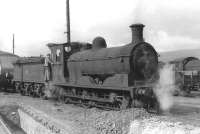
Fort William Shed: J36 0-6-0 no 65313 on Fort William shed in September 1961. Note the rear of the beaver-tail observation car on the far left of the picture.
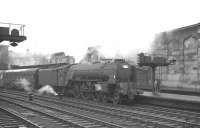
Carlisle: The 8.35am Glasgow St Enoch - London St Pancras stands at Carlisle platform 4 on a grey Saturday 7 September 1963. Locomotive in charge is Neville Hill A1 Pacific no 60131 Osprey.
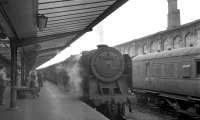
Carlisle: BR Standard Pacific 70000 Britannia stands at Carlisle on 7 September 1963 at the head of a military special.
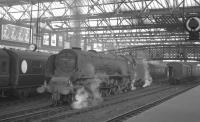
Carlisle: Standing on the centre road at Carlisle on 7 September 1963 is 46236 City of Bradford. The Pacific is awaiting the arrival of the 10.10 Euston - Perth, which it will take forward.
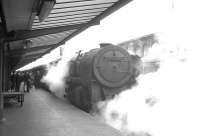
Carlisle: Had the locomotive been carrying a smokebox number plate it would have read 70000. Platform 1 at Carlisle on Saturday 7 September 1963 playing host to the eponymous Britannia Pacific herself, a Crew North locomotive at that time, recently arrived with a Halton - Newcastle military special.
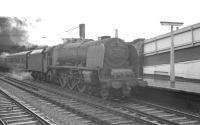
Carlisle: Late morning scene at Carlisle platform 3 in September 1963 as Stanier Pacific no 46249 City of Sheffield prepares to take out the 11am to Glasgow St Enoch. The locomotive was withdrawn from Polmadie shed 2 months later.
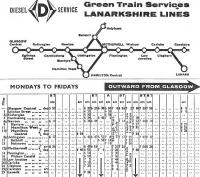
Plates, signs, notices etc: The 'Green Trains' brand surely didn't catch the public imagination like the 'Blue Trains'. Green ones were DMUs and had no magic automatic doors. Before the Argyle Line and full electrification they were used on Hamilton Circle and Lanark services from Glasgow Central main line station and served the old main line platforms at Rutherglen see image [[19471]]. This is part of the first page of these services from the BR Scottish Region timetable effective 7 September 1964 and is interspersed with other workings. South of Rutherglen we seem to have lost 3 stations and gained 2.
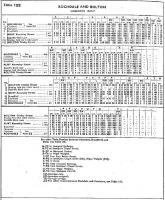
Plates, signs, notices etc: 1964 London Midland timetable extract showing the through trains on the line between Bolton and Rochdale, with many through carriages to and from a variety of destinations. Between Bury and Heywood the trains shown were supplemented by those from the Bacup line going to Manchester via Moston. The run down started soon after this date with Bacup services going in 1966 and full closure in 1970 but the section between Bury and Castleton now forms part of the East Lancashire Railway.
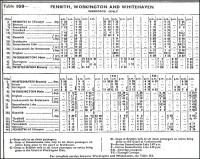
Plates, signs, notices etc: Table 169 from London Midland 1964 timetable showed the DMU service from Penrith through Cockermouth and Keswick to Workington. The basic weekday service of six trains each way is shown (and a seventh between Keswick and Penrith only). The line closed beyond Keswick in 1966 but services from there to Penrith lingered until final closure in 1972 See image [[37228]].
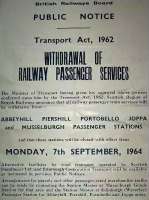
Plates, signs, notices etc: Withdrawal notice, Abbeyhill - Musselburgh, 7 September 1964.

Plates, signs, notices etc: Sparse service. Extract from the 1964 London Midland timetable showing services on the short Barnoldswick branch apparently being run down as a prelude to full closure. One train out, which presumably had worked down the branch ECS, one train back later that morning on Saturdays, which would leave ECS, and a return evening working Mondays to Fridays. This sad state of affairs continued for another year before the line closed in September 1965.
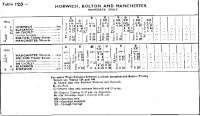
Plates, signs, notices etc: Table 123 of the London Midland 1964 timetable showing services on the short (1.25 mile) Blackrod to Horwich branch line. The footnote 'B' is a reminder of the triangular junction with the main line and that most Horwich services used the chord towards Bolton and missed Blackrod station. This was the last full year of operations as the branch closed in September 1965.

Plates, signs, notices etc: Table 101 in the London Midland 1964 timetable showing the services on the Llanfyllin branch, which ran from Llanmynech on the Cambrian main line from Oswestry to Newtown. For most of its life of course this line operated under the Great Western/Western Region but transferred to the London Midland Region in the 1960s. Branch services, and those on the main line, both ceased the following year.
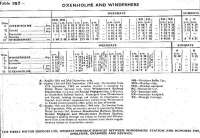
Plates, signs, notices etc: The Windermere winter timetable of 1964 shows a meagre seven departures (nine down trains) with some very long gaps between services. Sunday was even worse with the two trains shown only operating for two weeks and then it was a Ribble bus or nothing. In 2010 the branch enjoys an hourly service on weekdays (seventeen trains in total)and on Sundays there are fourteen departures.

Plates, signs, notices etc: Beeching's hidden policy? Many 1960s railwaymen said their lines were deliberately run down to prove the case for closure and Leek to Uttoxeter must have been one of them. By 1964 Leek was a branch terminus rather than a junction and the 1964 timetable extract shows the meagre service AND also the ludicrous situation where both the morning and evening trains crossed at Kingsley but ran ECS in the other direction. The operating costs in relation to passenger usage would have been very high and sure enough the line closed soon after although part of it is now preserved.
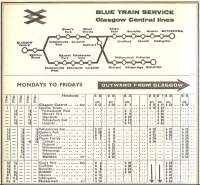
Plates, signs, notices etc: Part of the BR ScR timetable from 7 Sep 1964 to 13 Jun 1965 covering the South Clyde 'Blue Trains'.
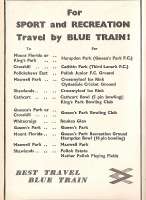
Plates, signs, notices etc: It's not necessarily a bad thing, but people did seem to be more easily amused back in the sixties if this page from the BR Scottish Region Timetable from 7 September 1964 is anything to go by. It's hard to imagine people today piling onto a train to visit many of these attractions. Of course it's possible they didn't then either which may explain why I've never heard of 5-pin bowling.
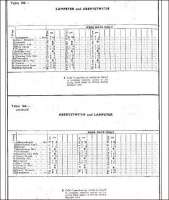
Plates, signs, notices etc: Extract from London Midland timetable of 1964 showing the sparse service between Aberystwith and Lampeter in South West Wales. This was the final appearance for the line, which was scheduled to close in February 1965. As a result of flood damage near Llanilar passenger services on the northern section ceased in December 1964 with the southern section following as planned although milk and local coal trains continued until as late as 1973.
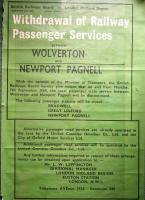
Newport Pagnell: BR notice regarding closure of the Wolverton - Newport Pagnell branch on 7 September 1964. See image [[27539]]

Plates, signs, notices etc: Freedom of Britain's rails from £1.79 a day. Advertisement in the BR Scottish Region passenger timetable 7 September 1964 to 5 June 1965. But would you want to go back?
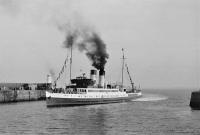
Troon Harbour: 'TS Duchess of Hamilton' entering Troon Harbour on a charter sailing in September 1968
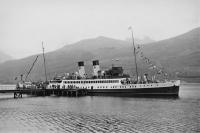
Arrochar Pier: 'TS Duchess of Hamilton' on a charter sailing at Arrochar in 1968. The Cobbler is prominent in the background haze.
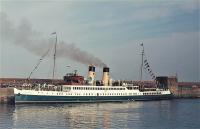
Troon Harbour: TS 'Duchess of Hamilton' on a charter at Troon harbour in 1968.
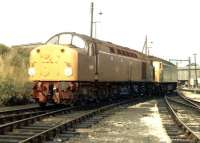
Crewe Diesel Depot: D319 and D1914 photographed at Crewe on a Sunday afternoon in the autumn of 1969.
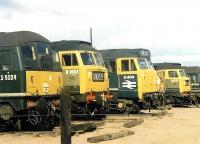
Crewe: Lazy Sunday Afternoon. A few not so Small Faces relaxing over the weekend at Crewe north stabling point in September 1969. From left to right in the picture are D5024, D1962, D404, an EE Type 4, D1707 and D5010.
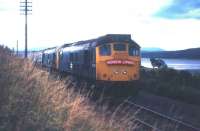
Bunchrew: A pair of Type 2 diesels with the 'Hebridean Express' charter train returning from Kyle of Lochalsh on 7th September 1971. The special is seen here in the late afternoon near Bunchrew on its way back to Inverness.
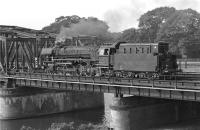
Hanekenfähre: DB mixed traffic 2-8-2 No. 042 113 had earlier worked an empty tank train to the oil refinery at Holthausen, just north of Lingen on the Rheine - Emden line. It is seen here returning light engine to Rheine MPD on 7 September 1974 and is about to cross the bridge over the River Ems at Hanekenfähre.
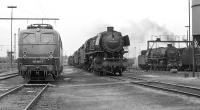
Rheine: A varied selection of motive power in the shed yard at Rheine in September 1974. On the left is type E40 electric No. 140 846 which was only two years old at the time. To its right stands heavy freight coal-fired 2-10-0 No. 044 534, which was a regular visitor from Emden depot, while on the far right is 3 cylinder oil-fired Pacific No. 012 066, which survives today in working order.
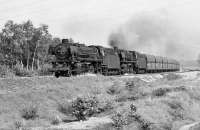
Hanekenfaehre: A 4,000 tonne iron-ore train from the docks at Emden passes Hanekenfaehre (near Lingen) at 10:21 on Saturday 7 September 1974 and enters the single track section over the River Ems. Motive power consists of oil-fired 2-8-2 No. 042 241 and coal fired 2-10-0 No. 044 534. Most of the 3-cylinder 2-10-0s which worked the Rheine-Emden line were oil-fired (latterly class 043) and shedded at Rheine, the coal fired ones of class 044 were allocated to Emden.
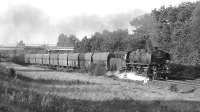
Meppen: DB oil-fired 3 cylinder 2-10-0 043 903 makes for Emden at Meppen with a load of bogie hoppers early on the morning of 7th September 1974. 043 903 had been built in 1943 by the French firm Batignolles in Nantes as 44 903 and remained in West Germany after WW2, unlike most of the French built members of the class running on DB metals, which were eventually repatriated to their country of manufacture.
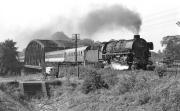
Hanekenfähre: Listen to that 3 cylinder roar! Oil fired Pacific No. 012 080 powers a northbound express over the River Ems at Hanekenfähre on the morning of 7th September 1974. The bridge was only single track at that time (possibly not having been fully rebuilt after WW2) and created something of a bottleneck. Double track has since been reinstated here.
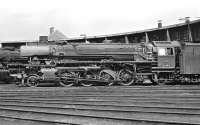
Rheine: DB oil-fired 2-8-2 No. 042 168, photographed during a visit to Rheine depot in the summer of 1974.
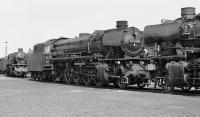
Bw Rheine (Rheine MPD): 042 241 and 044 534, seen near Lingen, came off their Ruhrgebiet-bound ore train at Rheine (from where electric traction would have taken charge) and I was able to photograph them both in the shed-yard there during the early afternoon - here 042 241 is sandwiched between two classmates, 042 113 to the left and an unidentified example to the right ...
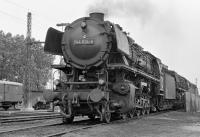
Bw Rheine (Rheine MPD): 044 534 has two oil-fired classmates, 043 321 and 043 336 for company.
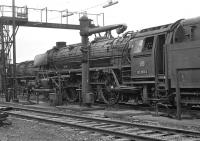
Rheine: One of the last surviving class 012 Pacifics operating between Rheine and Emden / Norddeich was No. 012 063, seen here in the shed yard at Rheine on 7th September 1974.
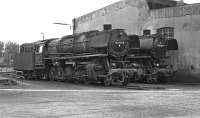
Rheine: Two oil fired 3 cylinder 2-10-0s, Nos, 043 737 and 043 087, in repose adjacent to the roundhouse at Rheine in September 1974. Pre-computerisation these had been numbered 44 1737 and 44 087 respectively but in 1968 the opportunity was taken to differentiate between oil and coal-fired locos and the former became class 043, the latter class 044. Both locos survived in service until the end of steam at Rheine in October 1977.
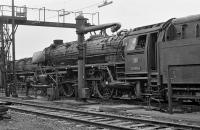
Rheine MPD: Rheine-Emden 1974. 012 063 is seen being serviced on Rheine shed shortly after bringing in train D1734, the 11:07 from Emden Aussenhafen (Outer Harbour), which continued to Koeln Hbf, but not behind steam. 7th September 1974.
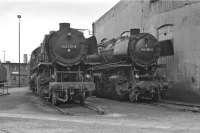
Rheine: Oil-fired 2-10-0s 043 737 and 043 087 stabled next to the roundhouse at Rheine in 1974. 043 737 was a product of the French firm Batignolles, built in 1944, while 043 087's origins were more what might be expected - the German firm of Henschel, emerging from the Kassel works in 1937.
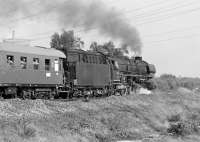
Hanekenfaehre: 012 080 forges north at Hanekenfaehre with train D1731 Muenster to Norddeeich Mole, which was booked to depart Rheine at 09:12. This was the last Saturday of the summer service and the last occasion on which this train was steam-hauled, hence the grocers at the windows of the leading coach. The cooling tower and chimney in the left background belong to Lingen nuclear power station. 7th September 1974
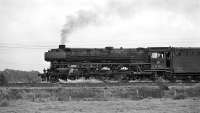
Salzbergen: The DB 3 cylinder oil-fired Pacifics of class 012 were most impressive machines, and no less so when viewed broadside. No. 012 055 was caught by the camera near Salzbergen while heading express D735 from Rheine (depart 11.01) to Norddeich on 7 September 1974 - this was a through working from Köln.
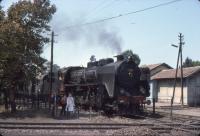
Izmir Poste B: Krupp built 2-10-2 57021 works no 1595 of 1936 heads for Ciyli at the Poste B flat crossing outside Basmane station in Izmir. More recently, this engine is, or at least was, dumped at Yesilkavak station but without its tender.
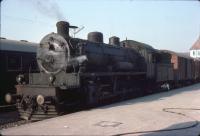
Izmir Basmane: Corpet-Louvet 2-10-0 56913, works no 1707 from 1926/7, awaiting its next shunting duty at Basmane station. The driver is making the most of the loco's shadow.
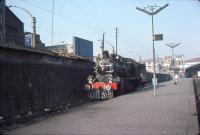
Izmir Basmane: R. Stephenson built 2-8-2 46105, works no 4073 of 1932, with the Driver and Fireman posing for the camera at Basmane station Izmir. Note that the loco has additional embellishment touches compared to the other locos, ahead of a special occasion the following day.
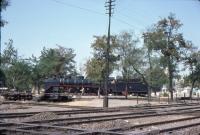
Izmir Poste B: With its number inconveniently hidden behind the telegraph pole, a 2-10-2 570xx takes the chord at the flat crossing, running light engine from Alsanak to Izmir Basmane station at Poste B.
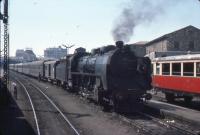
Izmir Basmane: Krupp built 2-10-2 57004, works no 1268 of 1933, is awaiting departure from Basmane station, Izmir, to Eskesir. An MV5100 Railcar is in the background.
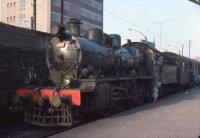
Izmir Basmane: R. Stephenson built (works number 3995 of 1929) 2-8-2 46103, waiting to depart from Basmane station, Izmir. This engine is now preserved at the Camlik Open Air Museum. Turkey reputedly has around 240 Steam Locos in museums or plinthed at a variety of stations. See http://www.trainsofturkey.com/ or https://www.steamlocomotive.info/country.cfm?which=turkey for more details
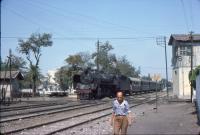
Izmir Poste B: Schwartzkopf 2-10-2 57017 (works no 1039 of 1935) runs over a flat crossing as it arrives with its train to Alsanak at Poste B, outside Basmane Station Izmir. Concern for the public at or near the lineside was non-existent in 1975.
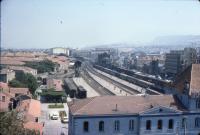
Izmir Basmane: The morning after the trip from Istanbul to Izmir, this was the view from the 6th Floor, Hotel Billur. As you can see it is very handy for Izmir's Basmane station.
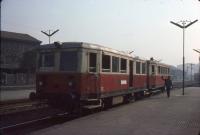
Izmir Basmane: One of a batch of six MV5100 Railcar DMUs, with its trailer, at Basmane Station Izmir in 1975. Built by MAN in 1942, it was used on those local services which did not justify the use of steam locos with hauled coaches.
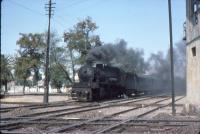
Izmir Poste B: Corpet-Louvet 2-10-0 56914 works no 1708 of 1926/7 is on a train from Alsanak to Izmir Basmane station
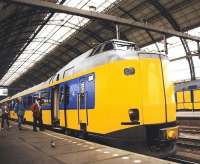
Amsterdam Central: 'See youse people...' A particularly arrogant looking NS train bound for Schiphol Airport boarding at Amsterdam Central in September 1985.
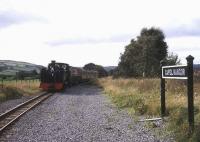
Capel Bangor: No 7 approaching Capel Bangor on the Vale of Rheidol line with a train for Devils Bridge in September 1988.

Glasgow Queen Street High Level: The driving position inside driving trailer 9709 at Glasgow Queen Street in 1989 with the train about to leave for Aberdeen. I'm not sure which 477 was in the rear. The panel of eight lights and buttons to the right are labelled (left to right, top and bottom); Engine Stopped/Line Indicator, Wheel Slip/Indicator, General Fault/Indicator, Fire Alarm/Test, Train Heat/Off, Train Heat On/Indicator, Train Heat/On, Fire/Extinguish. These driving cars were converted from mark IIf brake coaches and control of the locomotive was carried via the coaches' lighting circuit (which allowed extra coaches to be inserted as required). (Any corrections and more comments on that would be welcome - for instance I seem to recollect that these trains were built to a very tight budget as BR did not consider Edinburgh-Glasgow an InterCity service.) [Access with thanks to the driver.]
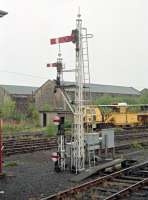
Stirling: A lower quadrant signal by Stirling goods office (to the immediate left) in 1989 with the goods sidings beyond in a south east looking view. The station was off to the right. At this date not much traffic originated from the yard but the sidings were used for marshalling trains for the south and part of the yard was in use as a dirt car park.
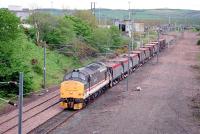
Millerhill Marshalling Yard [North]: An InterCity liveried class 37 locomotive leaving Millerhill Yard in September 1991 with a ballast train.
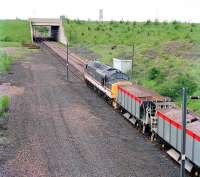
Millerhill Marshalling Yard [North]: A ballast train leaving Millerhill for the north in September 1991.
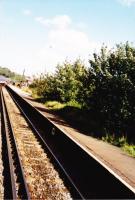
Folkestone East: Another closed station in Kent. This shot shows the boat train from Victoria, passing through Folkestone East Station, crossing over to the Up line before entering the reversing sidings. After a change of direction it then crossed Folkestone Junction see image [[62753]] en route to Folkestone Harbour Station for the ferry to Boulogne sur Mer.

Boulogne Maritime: HSC Hoverspeed Great Britain at the quayside next to the Gare de Boulogne Maritime. This Tasmanian-built Incat catamaran held the Blue Ribband (Hales Trophy) for the fastest east-bound trans-Atlantic passenger ship crossing which was achieved in 3 days, seven hours and 52 minutes in 1990. She was then used by Hoverspeed to ply the short sea crossings Dover/Folkestone to Calais/Boulogne. This vessel was later used on the Stranraer-Belfast route. For a view of the bow end-on see image [[56203]]
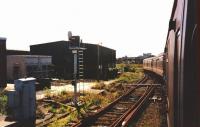
Folkestone Junction: Having reversed into Folkestone East Train Roads a boat train proceeds across Folkestone Junction down, in both senses, towards Folkestone Harbour Station in September 1992. For some reason it took the Up line and crosses to the Down line avoiding signal YE79 and the trap points. [Ref query 2 February 2018]
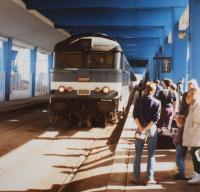
Boulogne Maritime: Classic diesel traction of SNCF Class BB 67400 hauls the incoming Paris train into the postwar trainshed at Boulogne in 1992. This was part of the new combined car ferry terminal and harbourside railway station opened in 1952. The previous station building from 1875 was heavily damaged during the 1940 Invasion of France and units of the Welsh Guards were engaged in defensive action in various parts of the structure and outbuildings before being forced to withdraw by sea. The remains were then totally destroyed by Allied bombing in the lead up to Operation Overlord when Boulogne Harbour was attacked from the air. In the postwar period the new station saw use as the departure point for the VSOE to Istanbul and, later, Venice. A good view of the layout and location of the Pont Secteur see image [[74222]] is available here: http://hhvferry.com/blog/?p=1969
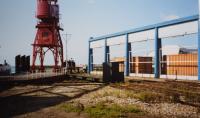
Boulogne Maritime: Mais oui, c'est un pont secteur... An example of a pivoting turnplate which allows locos to switch to one of several tracks amongst the station headshunts. This arrangement is like a partial turntable but with an incomplete circle. The black box was for the operator and moved along with the track. Clearly there was not a lot of space to build beyond the end of the platforms here without building out over the harbour wall. The blue pillars and lintels demarcate the boundary between the railway area and the ferry quay (orange containers). A shot showing a loco turning is available here: http://reseau3gg.centerblog.net/3696-un-pont-secteur-avec-une-bb-67400
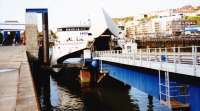
Boulogne Maritime: With the demise of Sealink conventional ferries on the route from Folkestone at the end of 1992 Hoverspeed started up a faster sea crossing. Catamaran ferry Hoverspeed Great Britain docked at Boulogne with bow raised to allow (dis)embarkation. This ship continued on this route only until 1993. It is a former holder of the Hales Trophy (Blue Riband) for a fastest trans-Atlantic crossing. The railway station area is off picture to the left.
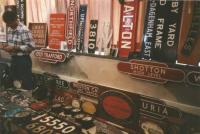
Beeston Castle and Tarporley: A totem from Beeston Castle and Tarporley (closed 1966) is among the goodies on display at this railwayana auction in September 1996.
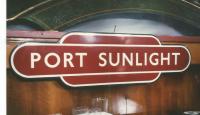
Port Sunlight: Totem from Port Sunlight station (still open today [[34644]]) seen at a Railwayana auction in 1996. The place is named after the soap whereas Bournville (also an open station) gave its name to the chocolate. As for Singer, take a guess.
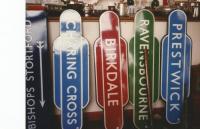
Prestwick: Some odd bedfellows at a railwayana auction at Sheffield in 1996. Bishop's Stortford seems to have lost its apostrophe. The blue colour shows that Charing Cross was the Glasgow one; the London totem (coincidentally one was also present) was identical but green. Prestwick was to become Prestwick Town after the airport station opened.
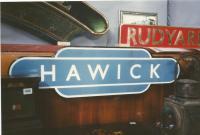
Hawick [2nd]: Hawick totem seen at a railwayana auction in 1996. I'll make a wild guess and say that the rest of that nameplate read 'KIPLING'. [Or was from Britannia 70035's nameplate.]
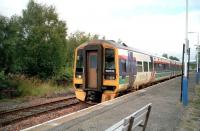
Lairg: A southbound service on the Far North Line arrives at Lairg in September 2001 on its way to Inverness. The A836 level crossing is just visible in the right background.
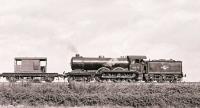
Sheringham: Preserved B12 no 61572 approaching Sheringham on 7 September 2001.
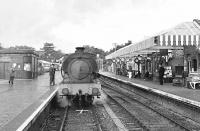
Sheringham: Scene on the North Norfolk Railway at Sheringham station on 7 September 2001 with class J94 Austerity 0-6-0ST no 8009 at the platform.

Princes Street [Tram]: A tram standing in Princes Street Gardens alongside the Scott Monument on 7 September 2005, having been borrowed from Nottingham and hoisted into the gardens by crane the previous day as part of an exhibition - a precursor to work getting underway on Edinburgh's new tram system.

Berlin Hauptbahnhof: The magnificent Berlin Hauptbahnhof, photographed in September 2007. Without doubt one of the finest modern stations in Europe.

Tay Bridge South Junction: HSTs passing each other under Wormit Den Bridge. Dundee West End is visible across the Firth of Tay.

Tay Bridge South Junction: 1451 Aberdeen - London KX heading south from Wormit. Dundee city can be seen in the background across the Tay Estuary.
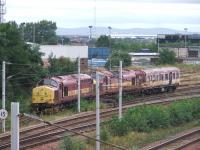
Motherwell MPD: EWS liveried 37427 and 37421 stored at Motherwell MPD, with an inspection saloon, on 7th September 2008. 37427 was later sold to DRS and taken to Kingmoor for spares recovery. It then went to Booths at Rotherham where it was cut up in February 2013. 37421 was more fortunate, passing from here into preservation at Blaenavon but more recently returned to the mainline with Colas and is presently (2020) working passenger services to Rhymney for TfW.

Heapey: A remarkable transformation has taken place at Heapey since closure of the direct Blackburn to Chorley line in 1960. The original two storey building has been added onto on all sides to make a very large private residence. It makes an interesting comparison with near neighbour Withnell See image [[23878]], which was originally an identical station. This view towards Chorley shows the gravel drive and garden covering the old trackbed.

Hoghton: Preston can be seen on the skyline as 142041 passes Hoghton summit, although it is still eight miles away. Immediately around this bend the unit will pass over the level crossing that marks the site of Hoghton station, closed in 1960.

Hoghton: Pacer in the Lancashire countryside. Northern 142056, on a Colne service, has just topped Hoghton bank and is dropping down towards the River Darwen and Pleasington station. The hill rising very steeply on the right supports the fortified manor house known as Hoghton Tower.
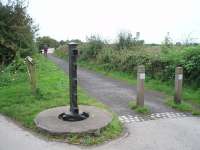
Conder Green: One of two surviving level crossing gate posts at Conder Green on the former Glasson Dock branch. From here to Glasson the line curves round the Lune estuary and, as the embankment now forms both a cycle track and local flood defences, the old railway is likely to be around for some time. View towards the bridge over the River Conder in the direction of Glasson.
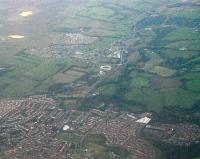
Drumgelloch: An aerial view along the newly laid A-B. Bottom left was the old Drumgelloch station, moving towards the centre is the new station and the line can be followed east through Plains and out towards Caldercruix.
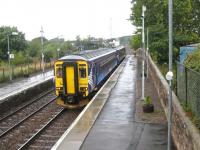
Annan: The 09.11 service to Newcastle (ex-Glasgow Central) calls at Annan on 7 September 2010.
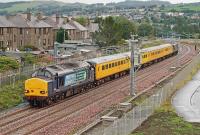
Polkemmet Junction: DRS 37611 leads the Network Rail Radio Survey Train on the up line toward Armadale and the west on 7 September 2010.

Woodacre Crossing: The evening DRS Sellafield to Crewe service approaches the site of Woodacre Crossing (replaced by a footbridge a few years ago) and is just about to cross the Grizedale Brook. 66415 and 66418 are hauling two flask wagons but this train can be very varied. The previous Thursday it ran with two Class 37s and two Class 66s with a single flask wagon and two nights after this picture was taken had two Class 66s, one Class 57 and five flask wagons.
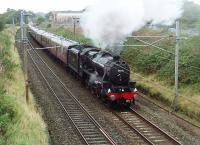
Oubeck Loops: A new face puts in an appearance on The Fellsman. LMS 5MT 4-6-0 45231 took a turn on the penultimate Fellsman from Lancaster on 7 September 2011. 24 hours previously the area was suffering from torrential downpours and flooding but things were a little improved on this particular morning. Here the Black 5 gets into its stride after climbing the bank out of Lancaster and heads south for Preston approaching Oubeck Loops.

Kilwinning: DBS 66221 with the early running 4J74 Cockenzie power station - Hunterston import terminal, runs through Kilwinning station on 7 September in atrocious weather conditions!

Preston: The 1M03 Shieldmuir to Warrington Royal Mail train, formed by units 325011 and 325002, waits for a path south from platform 6 at Preston on 7 September 2011

Bagnoles de la Orne: The defunct SNCF terminus at Bagnoles de la Orne, at the end of a short branch, coming off the line from Alencon to Avranches. Now employed as a Velorail (bicycle rail) enterprise.

Carlisle: Close-up of preserved Black 5 No. 45231 at Carlisle on 7 September 2011 waiting to transfer the coaching stock for the southbound 'Fellsman' from the sidings on the west side of the station into platform 1. The smokebox paintwork was somewhat the worse for wear but had been renewed by the following Wednesday.
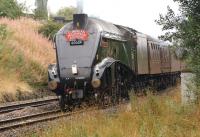
Chorley: The Cumbrian Mountain Express on 7 September 2013 was hauled by A4 no 60009, Union of South Africa. The tour is seen on the outward leg from Crewe to Carlisle via Stockport, Manchester Victoria, Bolton, Leyland, Blackburn and the S&C approaching Chorley.
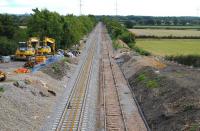
Oaksey Halt: The view south towards Swindon over the redoubling works at Oaksey on 7 September see image [[44507]].
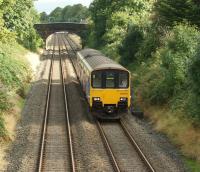
Clitheroe: Shortly after starting its journey to Manchester Victoria on 7 September, Northern DMU 150117 runs through the outskirts of Clitheroe. Underneath the bridge a lorry can already be seen on Low Moor level crossing.
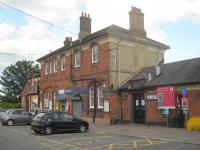
Chingford: Exterior of Chingford station on 7th September 2013. This is the terminus of the purely suburban line from Liverpool Street, which was taken over by London Overground on 31st May 2015. It opened by the GER on 2nd September 1878, replacing an earlier station of 1873 half a mile to the south when the line was extended and it was originally intended to continue further beyond here to a terminus at High Beech, an upland plateau and recreation area in Epping Forest but only a few yards were built and until the line was electrified in 1960, this served as an engine dock. It was swept away in 1968 to make way for a new bus station that replaced the one half a mile further on at the Royal Forest Hotel. At the same time, the platforms that had been linked by a subway were linked by a new walkway across the site of the engine dock and the subway was closed. In 1882, Queen Victoria arrived at this station to formally declare Epping Forest open to the public for all time.
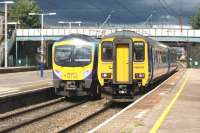
Leyland: As Northern 156472 departs south from Leyland on 7 September with a Preston to Hazel Grove service, First TPE 185132 passes through on a Manchester Airport to Blackpool service. Although the units are bathed in sunshine, the dark grey sky in the background gave an indication of what was to come.
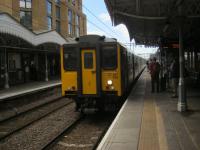
Walthamstow Central: 317504, from Liverpool Street to Chingford, arriving at Walthamstow Central on 7th September 2013. This service was taken over by London Overground in May 2015. The station, opened in April 1870. is a major east London interchange with local bus services and the northern terminus of the LUL Victoria Line. Before the latter opened in September 1968, the station was known as Hoe Street.
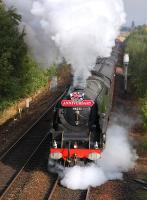
Friarton Junction: 46233 Duchess of Sutherland departs from Perth on 7 September with her 75th anniversary special to Sheffield, leaving a pall of steam over the site of Perth South shed.
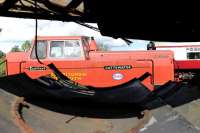
Cranmore: Sentinel shunter Cattewater as used by Esso, photographed at Cranmore on 7 September.
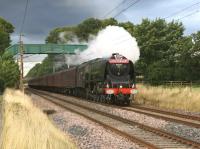
Brock: The returning 75th Anniversary special from Perth to Sheffield on 7 September, with 46233 Duchess of Sutherland at speed on the Brock straight. A nice touch was provided by the burnished buffers displaying the letters LMS. The Duchess hauled the tour south as far as Crewe.
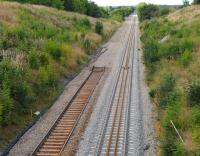
Oaksey Halt: View north from the road overbridge adjacent to the now demolished Oaksey Station on 7 September 2013 - part of the works associated with the doubling of the line from Swindon to Kemble.
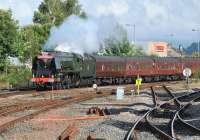
Stirling North Junction: 46233 Duchess of Sutherland approaching Stirling station southbound on 7 September during day 2 of the PMR Tours 75th Anniversary Special.
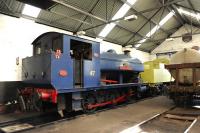
Cranmore: East Somerset Railway 0-6-0ST no 47 Moorbarrow (RSH 7849/1955) at Cranmore on 7 September, following a retube.
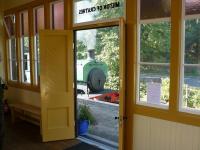
Milton of Crathes: The old station building previously at Oldmeldrum is enjoying a new lease of life at Milton of Crathes on the Royal Deeside railway. Here it is during celebrations to mark the 160th anniversary of the opening of the first section from Aberdeen to Banchory on 8th September 1853. See image [[12433]]

Pittenweem: Hard to know that this was once the local railhead. The motive power around Station Court, Pittenweem, closed in 1963, is a bit different 50 years on.
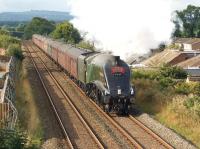
Clitheroe: A4 pacific no. 60009 Union of South Africa approaching Clitheroe running some 5 minutes ahead of time with the outward leg of the Cumbrian Mountain Express on 7 September 2013.
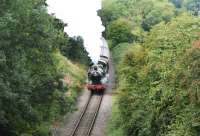
Mendip Vale: GWR Collett 56xx Class 0-6-2T no 5637 climbing away from the ESR's Mendip Vale Station on 7 September 2013.
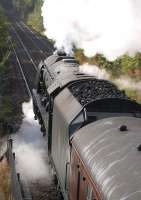
Friarton Junction: Stanier Pacific 46233 Duchess of Sutherland southbound from Perth on 7 September with the 75th Anniversary special.
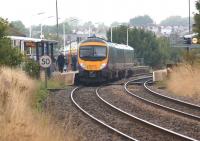
Chorley: A TransPennine service from Manchester Airport to Edinburgh Waverley calls at Chorley on 7 September 2013. The forthcoming electrification of the Chat Moss route from Manchester to the WCML at Golborne Junction will result in these services being diverted that way from December.
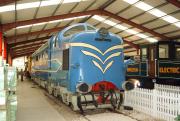
Preston (Ribble Branch): English Electric locomotives in the museum building at the Ribble Steam Railway on Preston Docks on 7 September 2014. On the left the iconic prototype Deltic and on the right a less well known example, a small 4 wheel battery loco.
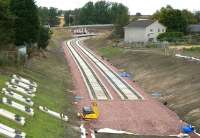
Shawfair: Looking north towards Shawfair station on 7 September 2014. Beyond the platforms is the new overbridge carrying the link from Millerhill Road which will give access to car parking facilities etc on the east side of the line.
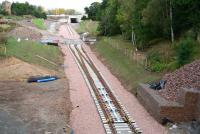
King's Gate Junction: Points, Sheriffhall, looking north towards the Edinburgh City Bypass on 7 September 2014. The track stops just short of the bridge over the Dead Burn.
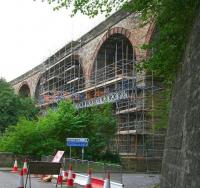
Newbattle Viaduct: Maintenance work in progress at the north end of Newbattle Viaduct in September 2014.
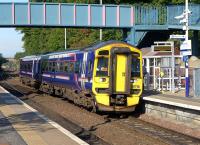
Dalgety Bay: The 07.58 from Tweedbank to Glenrothes with Thornton calls at Dalgety Bay on 7 September 2015.
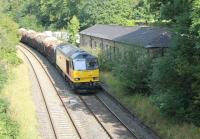
Chatburn: Colas 60087 passes through the overgrown platforms at the closed Chatburn station, between Hellifield and Blackburn, with the Carlisle to Chirk logs on 7 September. This train sometimes takes the Settle and Carlisle route and sometimes runs over Shap, just to keep everyone guessing.
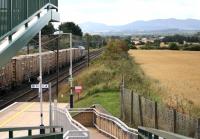
Wallyford: Looking west along the ECML towards Edinburgh from the station footbridge at Wallyford on 7 September 2016. The passing train is the 1326 Oxwellmains – Powderhall empty 'Binliner', hauled by 67009.
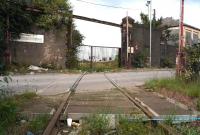
Albert Road Level Crossing: View west from Leith South yard on 7 September 2016. Looking across Albert Road towards the gated entrance to Leith Docks. See image [[4251]].
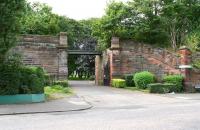
Seafield Junction [CR]: Between Seafield Junction (off to the left) and Leith East Goods the Caledonian crossed the entrance to Seafield Cemetery and Crematorium. View is south across Seafield Road in September 2016, with the old route now part of a walkway.
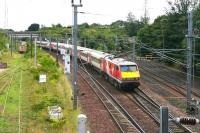
Portobello Junction: The 0615 London Kings Cross - Edinburgh Waverley Virgin Trains East Coast service runs through Portobello East Junction on 7 September 2016. Vehicles of the former (?) Overhead Line Maintenance Train reside in the siding in the left background. The white lineside notice reads 'Network Rail Portobello Maintenance Delivery Unit'.
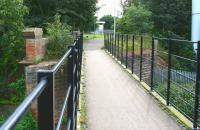
Seafield Junction [CR]: View east towards Seafield Junction in September 2016 with part of the chimney of Seafield crematorium visible on the right. The trackbed ahead curves south to the site of the former Junction (just out of shot). A pathway to the left leads to a stairway from Seafield Street, built alongside the surviving abutment of the bridge that once carried the NB route on the climb between Meadows Junction and Seafield Road Junction before crossing the bridge over Seafield Road itself (see image [[6701]]).
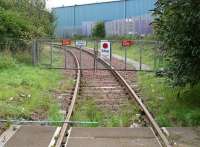
Albert Road Level Crossing: Entrance to Leith South yard from Albert Road level crossing in September 2016 with the dock entrance behind the camera. The newish looking gate is a remnant of the 'last hurrah' for the branch, when regular traffic made a 21st century return in order to move imported coal from the docks to Cockenzie Power Station (see image [[9623]]). The power station was finally shut down in March 2013. The gate on the right displays my all-time favourite helpful notice which reads... 'Open Gates Before Proceeding.'
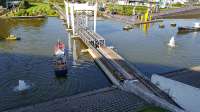
Madurodam: A tiny train crosses a scale model of Dordrecht Railway Bridge, a lifting bridge, at the Madurodam miniature park tourist attraction in The Hague. The model bridge lifts to allow 'shipping' to pass. The real bridge crosses the River Oude Maas between Zwijndrecht and Dordrecht on the Rotterdam - Dordrecht line.
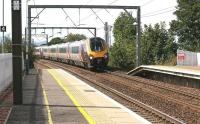
Prestonpans: Less than 10 minutes into its journey after leaving Waverley on the afternoon of 7 September 2016 a CrossCountry Voyager bound for Plymouth is about to run east through Prestonpans station.
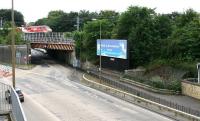
Portobello West Junction: A Virgin Trains ECML service about to cross Baileyfield Road, Portobello, on 7 September 2016. Running off to the left is Sir Harry Lauder Road, which follows the route taken by trains on the former Lothian Lines to Niddrie North. Just visible bottom right is an old arched bridge which once carried the original Edinburgh & Dalkeith route from Leith through to Niddrie West. This section was abandoned in 1849 after a connection was made with the ECML here via the nearest of the two bridges over Baileyfield Road (see image [[14242]]).

Seafield Junction [CR]: A dog walker heading along the former Caledonian route from Leith East towards Seafield Junction on 7 September 2016. The replacement pedestrian bridge crosses what appears to be a disused secondary entrance to Seafield Crematorium, with the main entrance spanned by a similar bridge located just behind the camera (see image [[76538]]).
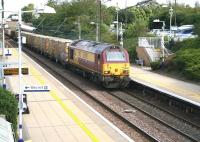
Wallyford: The 1326 ex-Oxwellmains empty 'Binliner' passing through Wallyford on 7 September 2016. The containers are on their way back to Powderhall refuse depot behind 67009.
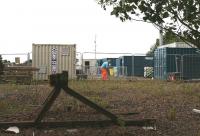
Millerhill Yard: View from the eastern perimeter of Millerhill Yard on 7 September 2016 with modular accommodation and storage in place and fencing erected. This is the north eastern corner of the old yard, with the buffer stops marking the limit of the former ballast siding see image [[3447]]. Whitehill Road runs just beyond the structures on the right. (COSHH = Control of substances hazardous to health.) The EGIP electric train depot is scheduled to open at Millerhill during 2017.
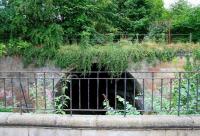
Figgate Burn Bridge [E&DR]: The bridge that carried the original Edinburgh and Dalkeith route between Leith and Niddrie West over the Figgate Burn, seen here in September 2016. View is west across the A199, with Baileyfield S&C Works to the right and the ECML off to the left. The route south from here was closed in 1859 by which time a direct link north from the ECML had been installed by the NB (see image [[75167]]).
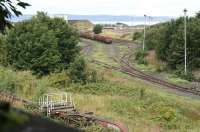
Leith South Yard: Leith South yard on 7 September 2016, seen from the high level trackbed of the Caledonian Leith East Goods branch. No signs of recent life in the yard, with the vehicles in the foreground alongside the south wall having become rather overgrown since they first arrived some 10 years ago. See image [[13862]].
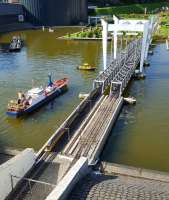
Madurodam: Traffic jam of model boats while a passenger train crosses the lifting bridge at Madurodam.
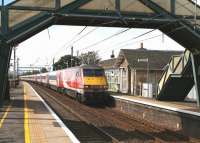
Prestonpans: An afternoon Virgin Trains East Coast service runs south through Prestonpans station on 7 September 2016.
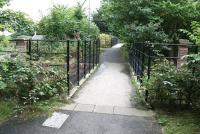
Seafield Junction [CR]: A stroll along the former Caledonian route from Leith East towards Seafield Junction in September 2016. The replacement pedestrian bridge crosses the entrance to Seafield Crematorium, with another just ahead spanning what appears to be an abandoned secondary entrance. Seafield Road runs past on the lower left of the picture heading for Portobello, while up ahead the old trackbed is starting to curve away south towards the junction.
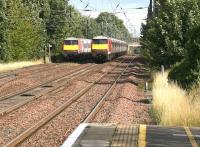
Prestonpans Loop: 'Race you to Newcastle...' Double take just east of Pestonpans station on 7 September 2016. The train on the left, being passed by an up Virgin ECML service, is in fact stabled in Prestonpans Up Passenger Loop. Following its two hour layover, the empty stock will move back to Waverley as the 5E19 from Prestonpans UPL, after which it will form the 1430 to Kings Cross.
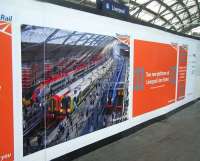
Liverpool Lime Street: Hoardings at Liverpool Lime Street in September 2017 showing the planned two new platforms.
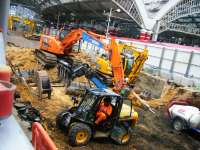
Liverpool Lime Street: This was taken over the fence showing the contractors working on the two new platforms at Lime Street.
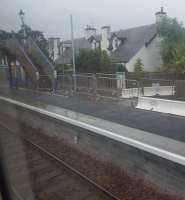
Kingussie: View from the window of a train at Kingussie. The far platform (southbound) has been raised for IEPs.
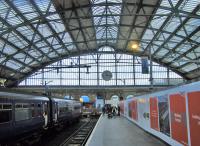
Liverpool Lime Street: The interior of the trainshed at Liverpool Lime Street showing the hoarding blocking the view of the platform works.
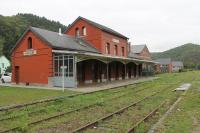
Hastiere: Hastiere station was on the line that ran along the Meuse Valley from Dinant in Belgium to Givey in France. The line and stations closed in 1988, although the tracks are still in place along the route. Hastiere station building is now a community centre, seen here on 7th September 2017.
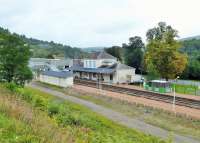
Fumay: Fumay, an intermediate unstaffed station on the Charleville to Givet branch line, seen on 7th September 2017. The line used to continue beyond Givet across the border into Belgium along the Meuse Valley to Dinant. This SNCF line currently enjoys a service of fifteen trains a day.
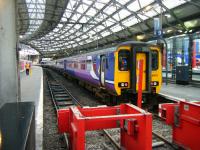
Liverpool Lime Street: 156421 at Liverpool Lime Street.
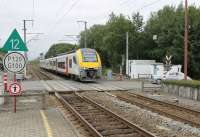
Paliseul: I didn't see many GB registered cars in Southern Belgium so it was a surprise when this Rolls-Royce Silver Cloud drew up at the level crossing barriers. SNCB 08517 slows for the stop at Paliseul station running from Libramont to Dinant on 7th September 2017.
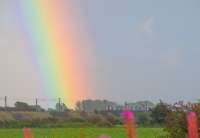
Byrehill Junction: Southbound 380 just south of Byrehill Junction and rainbow.
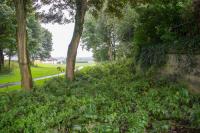
Kilwinning East Junction: Kilwinning East Junction, just south of Kilwinning East station was where the lines to Irvine Bank Street (left) and Ardrossan Montgomerie Pier (right) divided. The cutting has been infilled and landscaped. See image [[[[51478]]]]; the retaining wall to the right is the main reminder. View looks south.
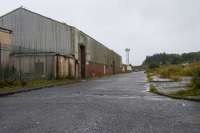
Eglinton Iron Works: This road more or less follows the first portion of the Doura Branch. This location was part of the site of the Eglinton Iron Works, Kilwinning (the building on the left is more recent, part of the Kilwinning Industrial Estate). The view looks west to Blacklands Junction, reached by passing under the Kilwinning - Byrehill Junction line in the distance.
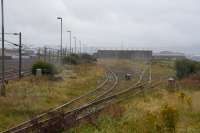
Falkland Yard: Falkland Yard, West Sidings, with nothing happening and looking slightly overgrown and rusty. There's far less coal traffic with only Killoch in use. In the background is the former Scottish Agricultural Industries works.
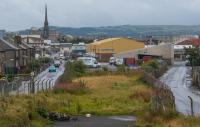
Ayr [1st]: The approach to the original Ayr station, seen from the north. Much of the site is built over and has new roads, as seen in the background. The original Ayr Shed was distant, on the right.
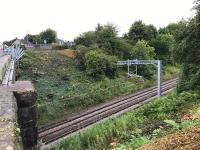
Baillieston: The location for the temporary pedestrian and services bridge, now cleared and awaiting the start of work on the foundations. A crane pad will be constructed behind the fence at the top of the cutting opposite.
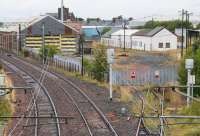
Ayr MPD: The out of use Ayr MPD viewed from the south, site of the former Hawkhill Junction. Track has been lifted but the buildings remain.
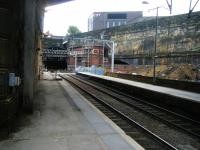
Liverpool Lime Street: Looking to the tunnel mouth at Liverpool Lime Street.
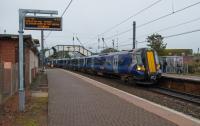
Newton-on-Ayr: A northbound 380 draws to a pause at Newton-on-Ayr, its first stop on the way to Glasgow.
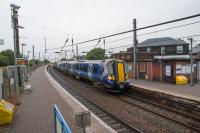
Newton-on-Ayr: Southbound train pausing at Newton-on-Ayr. The almost entirely bricked up building on up platform continues to stand.
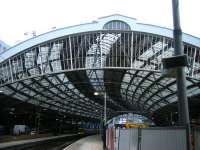
Liverpool Lime Street: One of the magnificent trainsheds at Lime Street.

Ayr [1st]: View north to Falkland Junction. The original Ayr terminus is some way behind the camera. Beyond the bridge seen here the line was crossed, on the level, by the Ayr Harbour Junction to Newton Junction curve.
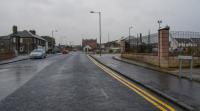
Ayr [1st]: View east on Waggon Road, the course of the former Ayr Waggonway. The line to the original Ayr terminus ran left to right in this view and there was a level crossing. The first Ayr shed was on the left.
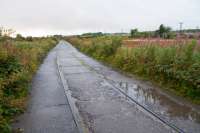
Stobbs Junction: This was one of the lines serving the Nobel Explosives site at Ardeer. It was concreted over to provide road (and retain rail) access to the site from the north east, thus preserving the line. The branch originally served Misk Colliery No1, Bogend Pit and a chlorine works. The branch closed when severed by the A78 dual carriageway. Track on this section was, not surprisingly, left in place. This is the view west towards the works, with the A78 on the right.
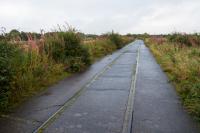
Stobbs Junction: This was one of the lines serving the Nobel Explosives site at Ardeer. It was concreted over to provide road (and retain rail) access to the site from the north east, thus preserving the line. The branch originally served Misk Colliery No1, Bogend Pit and a chlorine works. The branch closed when severed by the A78 dual carriageway. Track on this section was, not surprisingly, left in place. This is the view east to Stobbs Junction with the A78 on the left.

Ayr [1st]: View north from the site of the first Ayr station, a terminus. This location later had a large goods shed. There is nothing to give away the former use. On the right was the line which continued across the River Ayr to the south harbour.
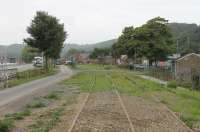
Hastiere: With the railway closed for nearly thirty years it is inevitable that the local population will create some unofficial crossing points of the unused tracks. This is the scene at Hastiere in Southern Belgium, taken from the north end of the station limits. The station itself see image [[60943]] can just be seen beyond the pile of pipes. 7th September 2017.
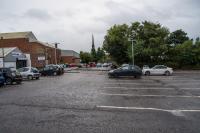
Ayr [1st]: View south towards the terminus at the original Ayr station. For a view while the line was still open and in use as a goods depot see image [[[[37055]]]] - note the spire of Ayr Town Hall in both photographs. The older photograph is a block further north.
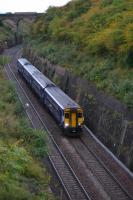
Omoa Siding: Two Class 156 Sprinters in Cleland Cutting on 7th September 2018 with a Glasgow Central to Edinburgh Waverley limited stopper.
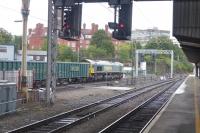
Preston: The low geared variety of Freightliner 66s are the regular motive power for the daily Shap Hardendale Quarry to Guide Bridge train of stone for Network Rail. On 7th September 2018 66605 took the train through Preston station. There were twenty five locos in the 66/6 sub class but six of these are now working in Poland.
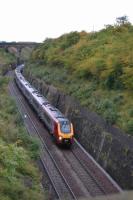
Omoa Siding: A Polmadie - Waverley empty stock Voyager passes through Carfin cutting on 7th September 2018. This is a regular move on Thursday and Friday mornings around 0730 apparently for route training purposes.
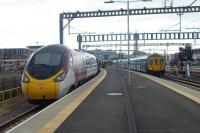
Blackpool North: A sizeable number of passenger leave 390020, newly arrived at Blackpool North from Euston, on Friday 7th September 2018. Northern 319364 departs for Preston on the other side of the Platform 1/2 island. As anticipated, the new gantries mostly obscure the view of the Tower from the platforms now.
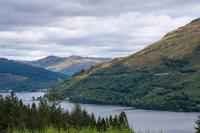
High Morlaggan Railway Cottage: A 66 with the empties on the climb uphill from Arrochar to Glen Douglas above Loch Long. A 37 would be preferable, this sounded like a vacuum cleaning working hard.
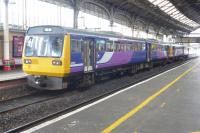
Preston: 55555 is the nicely numbered DMS of the otherwise non-descript Pacer 142014, seen here at Preston newly arrived from Manchester Victoria on 7th September 2018. This prompted a geeky search and I believe the only similar vehicle number is 77777, belonging to a DTSO of EMU 455726. Most if not all of Northern's Pacers will be withdrawn during the next fifteen months - will this one make it into preservation?
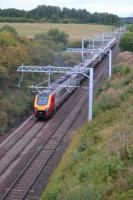
Omoa Siding: A Polmadie - Waverley empty stock Voyager passing through Carfin cutting on 7th September 2018. This is a regular move on Thursday and Friday mornings around 0730 apparently for route training purposes. In the background was the site of the Omoa Iron Works Signal Box.
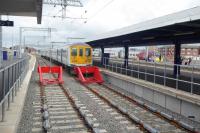
Blackpool North: 319446 is a recent addition to the Northern fleet and is still awaiting vinyls. The former Thameslink EMU is seen in Platform 4 at Blackpool North in between Manchester Airport services on 7th September 2018. Prior to the rebuild trains would stop much closer to the concourse. On the right a Pendolino, newly arrived from Euston, is in Platform 1.
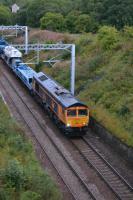
Omoa Siding: A Millerhill to Kingmoor engineering train approaches Cleland Cutting from the east.
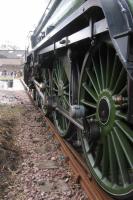
Ferryhill MPD: 60163's driving wheels, at the Ferryhill turntable, on 7th September 2019.
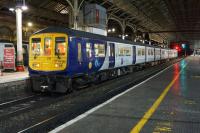
Preston: Out on a test run from Allerton Depot in Liverpool, converted 319 now 769450 has just arrived at Preston in the early hours of 7th September 2019. The unit has diesel power packs under each driving coach but on this occasion it arrived with the pan up. It also has had all the seating removed and replaced with sacks, possibly of sand to act as ballast. After an extended stop in Preston it returned south back to Allerton.
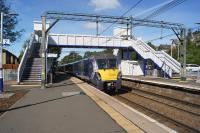
Westerton: 334033 passes Westerton non-stop with a service to Helensburgh on 7 September 2019. While Helensburgh services normally run via Yoker, on this Saturday they were being sent via Singer.
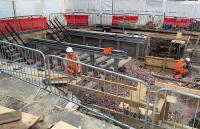
Glasgow Queen Street High Level: With just over a week to go before platforms 4 and 5 are closed for 4 weeks to complete the track extensions, preparations behind the screens at what will become the end of the new platforms are well advanced, with sleepers already in place at the frangible decking supports.
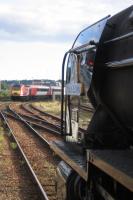
Aberdeen: A southbound LNER HST precedes 'Tornado' from Aberdeen on 7th September 2019.
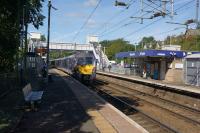
Westerton: 334009 is the rear unit on an Edinburgh to Milngavie service on 7th September 2019. The train is seen departing from Westerton.
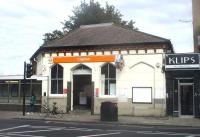
Clapton: Exterior of Clapton station, east London, on the afternoon of Saturday, 7th September 2019. This station was opened by the GER on 27th May 1872 and has been part of London Overground since 31st May 2015. Stansted Express and Greater Anglia trains to and from London Liverpool Street pass through non-stop.
See query 2155

Dundee Central Junction: Even in the gloamin', rail fans are out in force to watch 'Tornado' as it heads out of Dundee Down Loop (after a watering stop) on the return leg of the 'Aberdonian' on 7th September 2019.
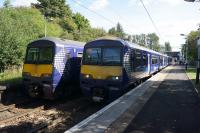
Singer: 320s call at Singer on 7th September 2019. On the left an eastbound service with 320418 (leading) and 320417 on the rear. On the right 320403 leads 318255 with a westbound service.
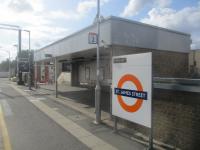
St James Street: Down platform for Chingford trains at St. James Street station, Walthamstow, east London, on 7th September 2019. The unaesthetic buildings, on this and the up platform, replaced the original Victorian structures about 100 years after the station's opening on 26th April 1870, the line becoming part of London Overground on 31st May 2015. The station name is slightly a misnomer as the thoroughfare, which the line crosses immediately to the west of the station, is actually called St. JAMES'S Street.
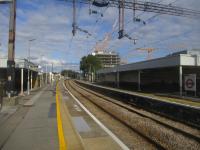
St James Street: St. James Street station, Walthamstow, east London, looking towards Chingford, on the afternoon of Saturday, 7th September 2019. This station was opened by the GER on 26th April 1870 and became part of London Overground on 31st May 2015. All the original Victorian buildings with their wooden canopies were replaced by the present less attractive shelters in the early 1970s, once again under the then BR Eastern Region regime's idea of 'improvements'. Wood Street station, two stops down the line towards Chingford, was similarly bludgeoned. Bruce Grove and Edmonton Green stations on the Enfield Town line managed to escape unscathed and today provide a good guide to how St. James Street and Wood Street stations used to look.
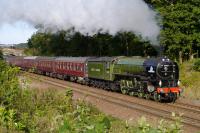
Dalgety Bay: 60163 'Tornado' nears Dalgety Bay with the 'Aberdonian' on 7 September 2019.
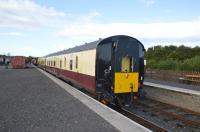
Alnwick (Lionheart): Lionheart Station on the Aln Valley Railway. A home made push-pull unit operates the services, but not true push-pull as the small cab area only contains a brake and the train cannot be driven from this end. 7th September 2019
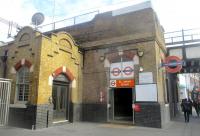
St James Street: Nobody could fail to notice that, since 2015, St. James Street station (the thoroughfare is actually called St. James's Street) on the Chingford branch in Walthamstow, east London, has been part of the London Overground network. The station opened in 1870 and while the original platforms have been seriously ruined by replacement of the original Victorian buildings and canopies, the station entrance at street level is more or less as constructed, apart from the new Overground signs. The line was electrified in 1960, the same year that saw trolleybuses swept away from east London so as the wires were going up across the bridge, they were coming down from underneath.
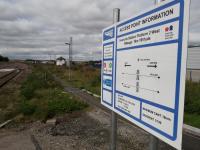
Inverurie: Notice at the Insch end of Platform 2, Inverurie.
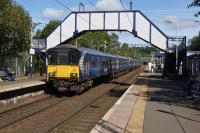
Anniesland: 318264 departs from Anniesland on 7th September 2019 with a service to Dalmuir.
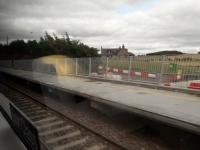
Kintore: Grab shot of the new Kintore platform on 7th September 2019.
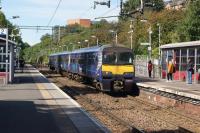
Singer: A Dalmuir to Larkhall service with 320322 arrives at the first station on the journey, Singer, on 07 September 2019.
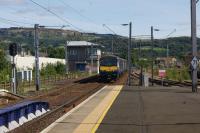
Dumbarton Central: 320313 approaches Dumbarton Central on 7th September 2019 with what should have been a service to Balloch but which ended up being terminated at Dalreoch. The former Dumbarton signalbox dates from the electrification of the North Clyde services in 1960.
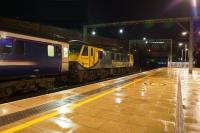
Preston: 1S25 London to Inverness, with through carriages to Aberdeen and Fort William, known as The Highland Sleeper, calls at Preston in the early hours of 7th September 2019. For a little while longer, 90043 hauls the Mark 3 sleepers and Mark 2 'day' coaches while the issues with the new Mark 5 stock are ironed out.
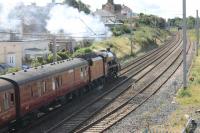
Hest Bank: 45699 'Galatea' takes a rake of ECS south through Hest Bank, heading from Carnforth to Burton on 7th September 2019, prior to working a special to Stratford-upon-Avon the following day.
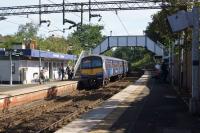
Drumchapel: A Larkhall service, with 320311, calls at Drumchapel on 7th September 2019.
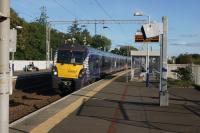
Cardross: Another late running westbound service arrives at Cardross on 7th September 2019. Delays to services had been caused by a unit failure on the Balloch line which resulted in congestion at Dumbarton Central where many Balloch services were terminated.
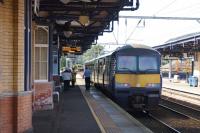
Dumbarton Central: 320313 waits in platform 2 at Dumbarton Central as in the distance 318252 returns from Dalreoch 'bang road' to enter platform 3 during a period of disruption on 7th September 2019.
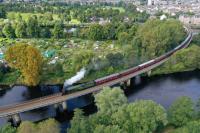
Tay Viaduct [Perth]: Class A1 No.60163 'Tornado' departs Perth on time and crosses The Tay Viaduct above Moncreiffe Island.The island is noted for it's allotments and the King James VI Golf Course.The viaduct has a footpath on the north side for access to the island.
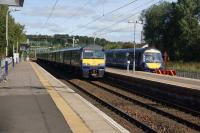
Anniesland: 320416 arrives at Anniesland on 07 September 2019 with an eastbound service, while 170414 waits in the bay platform to head back to Queen St High Level via Maryhill.
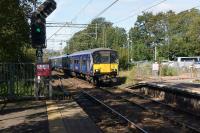
Westerton: An eastbound service with 318269 crosses Westerton Jct and enters Westerton station on 7th September 2019.
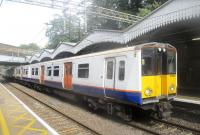
Clapton: 315806, with a London Overground service from Chingford to Liverpool Street, arriving at Clapton station in east London, on 7th September 2019 during its last year of service. This EMU was eventually withdrawn and scrapped in 2020, along with many other redundant Class 315s. Stansted Express trains to and from Stansted Airport and Greater Anglia trains to and from Cambridge pass through this station non-stop.
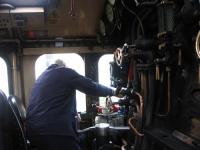
Ferryhill MPD: I was lucky enough to have a hurl on the 'Aberdonian' (including two spells on the footplate of 60163). However, no camera can capture the sensory experience of steaming into the sunset west of Dundee at 75 mph, with all that rattling, hissing, whistling and flickering flame! This image was taken at lower speed as West Coast Railways' Operations Manager, Peter Walker (formerly a Traction Inspector at Eastfield MPD), eases Tornado on to the Ferryhill turntable in Aberdeen on 7th September 2019.
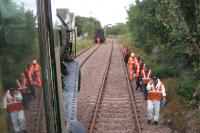
Ferryhill MPD: The Aberdonian's operating team file past 'Tornado' en route to coaling, watering and turning at Ferryhill on 7th September 2019. Their Support Coach sits in the concrete-sleepered loop jointly managed by Network Rail and the Ferryhill Railway Heritage Trust
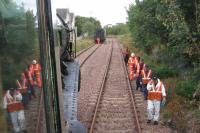
Ferryhill MPD: The Aberdonian's operating team file past 'Tornado' en route to coaling, watering and turning at Ferryhill on 7th September 2019. Their Support Coach sits in the concrete-sleepered loop jointly managed by Network Rail and the Ferryhill Railway Heritage Trust.
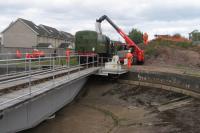
Ferryhill MPD: Coaling 'Tornado' beside the Ferryhill turntable on 7th September 2019.
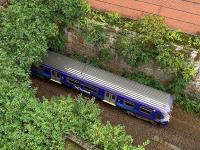
Glasgow Queen Street Low Level: Bird's eye view of 320315 and 320413 on a Balloch – Airdrie service as they emerge from the tunnel west of Queen Street Low Level station on 7th September 2020.
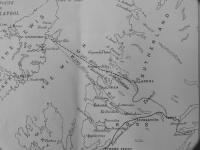
Map: This is part of a map featured in Andrew Drummond's new history - 'A Quite Impossible Proposal' - of the many attempts to deliver a railway from Garve to Ullapool. The map was prepared by John Dixon, promoter of the rival Achnasheen to Aultbea railway, and it is a map with an agenda. Stornoway is clearly shown to be closer to Aultbea than to Ullapool. The fact that Ullapool has been misplaced about 3 miles eastwards of its actual location is significant. As is the highly exaggerated loop of the detour of the Ullapool railway at Braemore.
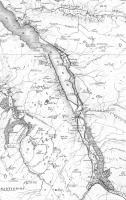
Map: A map from Andrew Drummond's 'A Quite Impossible Proposal' shows part of an annotated Ordnance Survey sheet, prepared by Murdoch Paterson for submission with the plans for the Garve to Ullapool Railway in 1890. The route of the railway was marked in red ink - here shown in bold - clearly circling round the head of the glen at Braemore, into a tunnel, then heading off down to Loch Broom for Ullapool.
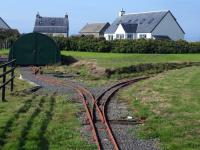
Ballantrae: In spite of 'definite' closure a year ago, this garden centre has reopened under new ownership. The miniature train remains and will apparently return to service in 2022.
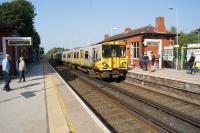
Formby: I ventured out on 7 September 2021 to try to photograph one of Merseyrail's new Class 777 units out on test between Sandhills and Southport. On Monday one of the two paths was used but unfortunately for me none of the paths were used so I had to make do with 508143 and another unit on a Southport to Hunts Cross service as it arrived at Formby. As the man said as I left, better luck next time!
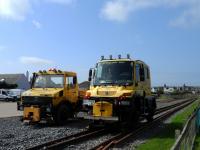
McCulloch Rail: McCulloch Rail track maintenance vehicles at Ballantrae, alongside the currently unused Craigiemains garden centre miniature railway. If this reopens as announced perhaps they could scrub the rust off the rails with one of these vehicles, although the track gauge might be a little narrow.
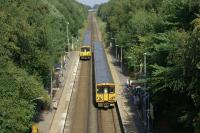
Aughton Park: A view from the road bridge above the platforms at Aughton Park on 7 September 2021. On the left 508125 departs northwards to Ormskirk while on 508139 arrives from Ormskirk with a service to Liverpool Central.
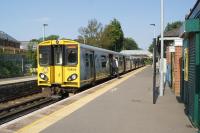
Town Green: 508125 calls at Town Green on 7 September 2021 with a service to Liverpool Central. This is the second stop on the Ormskirk line and the last in Lancashire before crossing the boundary into Merseyside. The building on the right houses the ticket office at this end and Lancashire's most southerly police station at the other.
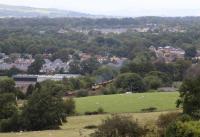
Whalley Viaduct: 70803 leaves Whalley Viaduct and begins the long slog out of the Ribble Valley with the daily log train from Carlisle to Chirk on 7th September 2022. Whalley station can be seen in the distance on the opposite side of the bridge.
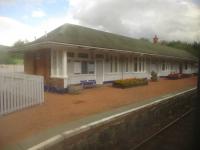
Tulloch: Tulloch station, looking back south from the ex-12.22 service from Glasgow Queen Street to Mallaig, reversing at Fort William, calling on Wednesday, 7th September 2022. This is the first station on the line north of Glasgow with two side platforms unlike the stations with island platforms that have gone before.
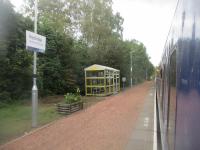
Roy Bridge: The ex-12.22 service from Glasgow Queen Street to Mallaig, reversing at Fort William, calling at Roy Bridge on Wednesday, 7th September 2022. This station was formerly a crossing loop, long abandoned, but the disused platform is still there, out of view on the right.
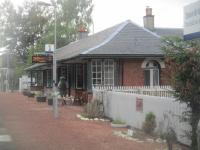
Spean Bridge: A solitary passenger leaves the ex-12.22 service from Glasgow Queen Street to Mallaig, reversing at Fort William, at Spean Bridge on Wednesday, 7th September 2022. This station opened with the West Highland Line in 1894 and from 1903 became the junction for a branch that ran north through the Great Glen to Fort Augustus where it terminated on a pier by Loch Ness. The passenger service on that line only lasted until 1933 and it was completely abandoned in 1947.
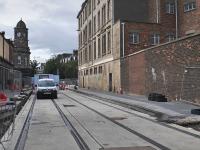
Foot of the Walk [Tram]: Looking south to Foot of the Walk tramstop, with the clocktower of Leith Central station on the left, on 7 September 2022.
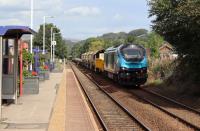
Langho: Impressive pulling power from 68019 'Brutus', with an engineers train from Carlisle New Yard to Crewe, climbing the bank through Langho on 7th September 2022. Not the longest train I've seen but most of the wagons were loaded with concrete sleepers so it was very weighty.
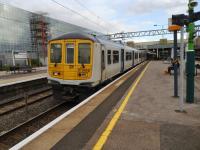
Milton Keynes Central: It was a truth universally acknowledged, that Bed-Pan 319s did not run North of Bedford. Except now they go to Northampton, Blackpool North and other destinations too, but I can't get excited about the wanderings of EMUs.
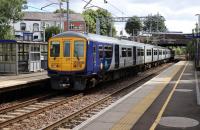
Moses Gate: Hybrid unit 769450 is drawing overhead power as it leaves Moses Gate with a Southport to Stalybridge service on 7th September 2022. The previous stop at Bolton is where the changeover from diesel power is made.
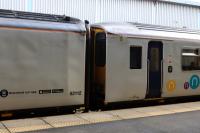
Bolton: The redundant cab of DMS 57209, now the centre car of hybrid Sprinter 150003, seen at Bolton with blue cab-vinyls removed working a Clitheroe to Rochdale service on 7th September 2022. This car ran in Northern service paired with 57212 as 150209 until recently, but both had lost their as built pairs in accidents so that was a train without a toilet. Adding them both into other Sprinters to make three-car sets has removed that problem.
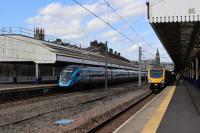
Bolton: TPE and Northern services call at Bolton on 7th September 2022. 397009 was heading for Glasgow from Manchester Airport, the destination of 331008 from Blackpool North. The clock tower at Bolton Town Hall is a very visible landmark.
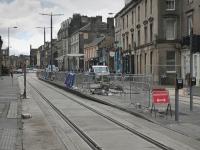
The Shore [Tram]: The new Shore tram stop on Constitution Street, looking south on 7th September 2022.
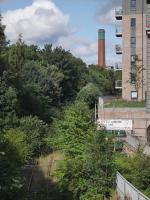
Leith Walk: Looking over the latter-day Powderhall branch at Leith Walk in September 2022, with nature taking over.
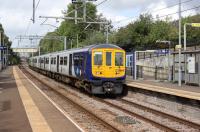
Farnworth: Flex hybrid unit 769431 passes through Farnworth with a Southport to Alderley Edge service on 7th September 2022. This will have run on diesel power Southport to Bolton but will draw from the wires for the remainder of the trip. Although Farnworth is a substantial town, old maps of the area show that the L&YR goods facilities were at nearby Moses Gate rather than here.
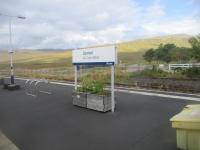
Corrour: Corrour station is the most isolated on the West Highland Line with no road access. Seen here from the Mallaig portion of the ex-14.22 service from Glasgow Queen Street, reversing at Fort William, on Wednesday, 7th September 2022.
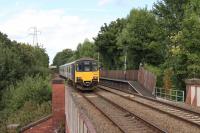
Hall i' th' Wood: 150003, one of the three car sets more or less dedicated to Clitheroe Rochdale services, pulls away from the staggered platform at Hall i' th' Wood heading towards Bromley Cross on 7th September 2022. The on board announcements pronounced this stop as 'Hallythwood' and who am I to argue with that?
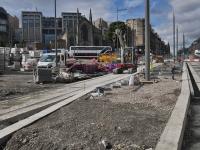
Picardy Place [Tram]: Picardy Place stop taking shape, looking towards the end of the active line at York Place on 7th September 2022.
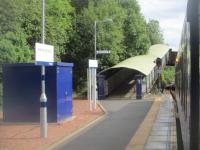
Helensburgh Upper: The ex-12.22 service from Glasgow Queen Street to Oban and Mallaig, dividing at Crianlarich, calling at Helensburgh Upper on Wednesday, 7th September 2022. This view is looking back south towards Glasgow with the long, covered entrance ramp leading down from the overbridge. After two nights in Glasgow, my friends and I were on our way to Fort William for three nights, and which stay included a trip on 'The Jacobite' to Mallaig and back.
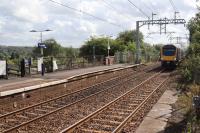
Kearsley: A pair of Northern 331 EMUs hurry through Kearsley towards Bolton on 7th September 2022. There are no original buildings on any of the intermediate stations between Bolton and Salford, just the usual modern platform shelters. On the Up Manchester platform, which is lower than the Down, there is a Harrington Hump at the south end. A subway connects the two sides.
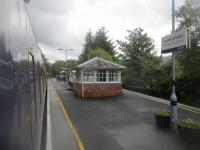
Arrochar and Tarbet: The ex-12.22 service from Glasgow Queen Street to Oban and Mallaig, dividing at Crianlarich with the Mallaig portion reversing at Fort William, calling at Arrochar & Tarbet station, looking north, on Wednesday, 7th September 2022. Unlike at Ardlui, the train is using the left-hand side of the island platform in the normal way, although no southbound train was booked to pass here, that had occurred at Ardlui where, unusually, the trains had crossed on the right.
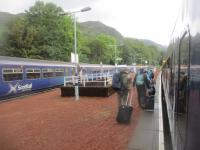
Ardlui: Ardlui station at the north end of Loch Lomond, looking north, with passengers alighting from the Mallaig portion of the ex-12.22 service from Glasgow Queen Street (with the Oban portion being detached at Crianlarich) on Wednesday, 7th September 2022. On the left is a southbound service to Glasgow Queen Street; contrary to the normal British rule of passing on the left at stations on single track lines with passing loops, these trains unusually, are here crossing on the right.
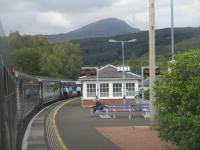
Crianlarich: With joining passengers now safely aboard the Mallaig portion of the ex-12.22 service from Glasgow Queen Street, and the Oban portion gone on its way, the train that will reverse at Fort William is ready to depart from Crianlarich on Wednesday 7th September 2022, here using the left hand platform at this crossing point in the usual way.
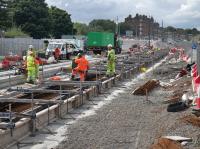
Ocean Terminal [Tram]: The last big gap in the trackwork to Newhaven is on Melrose Drive, between the Ocean Terminal and Newhaven stops. The workforce were preparing shuttering for the concrete pour on 7th September 2022.
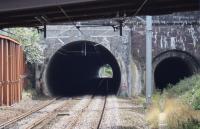
Farnworth Tunnel: There's something about the old small bore tunnel at Farnworth, alongside the new double track bore, that reminds me of the Rev. Awdry story about 'Henry' being bricked up in a tunnel. This is the view towards Manchester, from the end of the platform at Farnworth station, on 7th September 2022. See image [[50273]] from before electrification and tunnel widening work started.
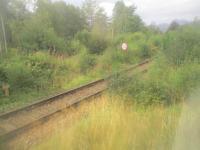
Crianlarich: Just to the north of Crianlarich, the 1897 spur to the surviving western section of the Callander & Oban line diverges and descends. It was not regularly used by passenger trains until 1965 when the eastern section of the C & O through Killin Junction was closed. This view is from the Mallaig portion of the ex-12.22 service from Glasgow Queen Street, reversing at Fort William, diverging away from the Oban line on Wednesday, 7th September 2022. We came back from Oban to Glasgow a week later after three nights in Fort William and four nights on the Isle of Mull.
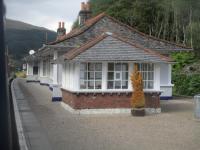
Upper Tyndrum: Upper Tyndrum station, looking north, seen from the ex-12.22 service from Glasgow Queen Street to Mallaig, reversing at Fort William, on Wednesday, 7th September 2022.
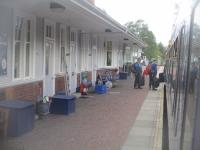
Bridge of Orchy: Bridge of Orchy station, seen from the Mallaig portion of the ex-12.22 service from Glasgow Queen Street, looking north, calling on Wednesday, 7th September 2022. The train is calling at the right-hand side of the island platform, against the usual rule of passing on the left, though no southbound train was booked to pass here at this time.
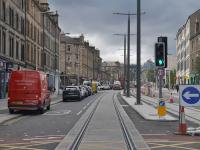
Balfour Street [Tram]: Looking south from near the new Balfour Street tram stop on 7th September 2022.
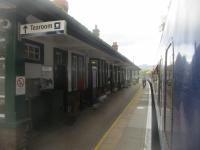
Rannoch: Rannoch station, with its exhibition and refreshment rooms, looking north from the ex-12.22 service from Glasgow Queen Street to Mallaig, reversing at Fort William, on Wednesday, 7th September 2022. This northbound train is calling at the right-hand side of the island platform, against the normal left hand rule.
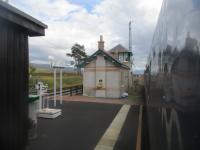
Corrour: Corrour station, near the summit of the line, looking back south from the ex-12.22 service from Glasgow Queen Street to Mallaig, reversing at Fort William, on Wednesday, 7th September 2022. This is the most isolated station on the West Highland Line with no (public) road access. The old signal box now serves as holiday accommodation and in which somebody has taken up residence.
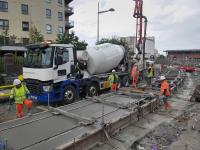
Ocean Terminal [Tram]: The last big gap in the Trams trackwork to Newhaven is on Melrose Drive, between the Ocean Terminal and Newhaven stops. Concrete was being poured on 7th September 2022.
Events
Events from the chronology which occured on this day. This generally lists events before 1995, the creation of the website.
News
These are old news items which which occured on this day. This generally lists events after 1995, the creation of the website.
| Year | Companies | Description |
|---|---|---|
| 2000 | Fire on Oil train at Beattock | A southbound freight train of 18oil tank wagons carrying diesel en route from Motherwell to Carlisle stopped at Beattock at 02:00 when one of the wagons caught fire after a leak. Fire engines from Strathclyde and Dumfries and Galloway attended but the fire had burned out on their arrival. |
| 2007 | Passengers urged to get on board for rail meeting [Scotsman] | RAIL passengers are invited to give their views on First ScotRail^s North Berwick services later this month. |
| 2010 | Music mogul launches £1m railway appeal [BBC] | A £1m appeal to repair a collapsed embankment on a heritage rail line has been launched by rail enthusiast and music producer Pete Waterman |
| 2011 | ‘Cruddy and decrepit’ Oxford Road railway station is given £484k makeover [Manchester Evening News] | A railway station described as ‘decrepit’ and ‘cruddy’ by a passenger watchdog has been given a £484,000 refit. New platform shelters have been built, stairs revamped and toilets refurbished at the Grade II-listed Oxford Road station. |
| 2012 | Weardale Railway platform built on wrong side of the tracks [Journal] | A RAILWAY platform costing thousands of pounds cannot be used – because it’s on the wrong side of the tracks. County Durham’s Weardale Railway was unaware the specially-made steel structure at Witton-le-Wear did not automatically qualify for planning permission and had it built it earlier this year. But planning chiefs have now told the heritage railway line it does not qualify and none of its passengers can use it. Statutory powers would have allowed workers to build a station on one side of the line as there had been a station there in the past. |
| 2012 | Paisley Canal Electrification set to begin [Network Rail Article] | Construction work is about to begin on the £12m project to fully electrify the railway line between Paisley Canal and Glasgow Central. Following extensive preparatory works along the line of route, engineering work will commence on Saturday, September 22. Designed to improve efficiency and reliability on the route, the project will see five miles of railway electrified between Paisley Canal and Corkerhill, sections of track altered to allow electric trains to run on the line and the enhancement of stations and bridges. Scheduled for completion by December, the project is the first to be delivered under a landmark new alliance between Network Rail and ScotRail. |
| 2013 | Borders Railway work will cause Sheriffhall closure [Evening News] | MOTORISTS have been warned to expect delays after overnight closures of the Sheriffhall roundabout began. The A720 bypass between Sheriffhall and the Old Craighall Roundabout is closing overnight this weekend and at the end of next week as part of work on the new Borders Railway. |
| 2014 | Tank engine to star on steam heritage line [Northern Echo] | A SYMBOL of County Durham^s railway heritage is to return for the first time in over four decades. The iconic “Lambton Tanks” tank engines were famed for their work on coal trains between collieries in the Houghton area and staithes in Sunderland. They found cult status in the late 1960s when photographers and enthusiasts from around the country flocked to Philadelphia sheds to see their last days. Now, for the first time since the early 1970s, one is to return as star guest at an event on the volunteer-run Tanfield Railway, near Stanley. |
| 2016 | Historic Aberdeen turntable on track for new lease of life [Press and Journal] | An A-listed railway turntable in Aberdeen is on track for a major refurbishment to bring it steaming back to life. Last August, Ferryhill Railway Heritage Trust was awarded £298,158 by Historic Scotland for the purpose of renovating the former Ferryhill Locomotive Depot. [From Charlie Niven] |
| 2016 | David Spaven: We need to save one of Scotland’s heritage routes [Scotsman] | The Far North Line is one of the great rail survivors, but action is needed to ensure it stays on the transport map, says David Spaven Britain’s longest rural railway – the 168-mile Far North Line from Inverness to Wick and Thurso – is one of the country’s most remarkable rail survivors. |
| 2018 | My, my! Waterloo celebrates 170 years [RAIL] | Britain’s busiest station. The busiest transport hub in Europe. As famous as New York’s Central Station. |
| 2018 | New electric train ready for North Berwick route [East Lothian Courier] | A NEW six-carriage train will link North Berwick and Edinburgh from Monday. |
| 2019 | Ticket prices error an affront to rail passengers, MSP claims [Press and Journal] | Cheaper railfares are on the cards for passengers after an MSP exposed a ticket machine glitch that was concealing cheap fares. |

